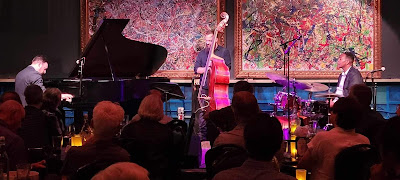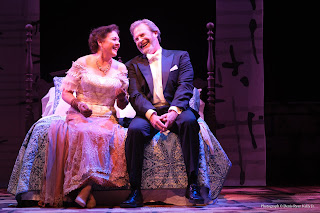Zach Lapidus returns to town where he made his reputation to play in the Kenny Phelps Trio
 |
| Bandmates Nick Tucker and Kenny Phelps focus on Zach Lapidus. |
It seemed a perfect start to a reunion session with special guest Zach Lapidus and Kenny Phelps.
On Sunday night at the Jazz Kitchen, Phelps laid down a drum pattern at first unaccompanied, with a snare drum emphasis as the pianist entered. There was something mercurial about how both musicians played, yet the quirks always worked together, as they continued to do when bassist Nick Tucker joined, setting up a solo during which, contrary to the cliche, nobody in the nearly full club talked.
The audience atttention remained steady and enthusiastic over the hour-plus set. Opportunities to hear American Pianists Association competition finalist Lapidus live here have been rare since he left town in 2014.
The solo set the tone for much of Tucker's playing in solos that were strongly defined and firmly phrased, intense but never cluttered or frantic. The piece was "Windows" by Chick Corea, and a smooth segue to Dizzy Gillespie's "Con Alma" followed after an unaccompanied piano link.
The long set by the Kenny Phelps Trio, with Phelps' vocalist wife Valerie as producer, amounted to a reunion of the three players as well as one with a local fan base that has grown in size and loyalty since Lapidus competed in the 2015 Jazz Fellowship Awards.
Settled in Brooklyn, N.Y., and married with a small child, Lapidus spoke briefly of the relevance of Ornette Coleman's "When Will the Blues Leave?" after the trio played it, his personal reference to the title being a tad facetious. Phelps played one of his take-no-prisoners solos in that performance. Elsewhere he was typically inventive in exchanges with the pianist.
He was properly the spokesman for the group during the set, announcing the tunes. Along the way he mentioned his frequent employment along with Tucker for the trio sets in the APA's jazz competitions. Over the years, he said, he has concluded that Lapidus remains at the top of the field.
One of Lapidus' strengths is a well-knit manner that, for instance, in Thelonious Monk's "Bye-Ya" comes across as both flowing and (evoking the composer) spiky. There was more good bass and drum soloing and a captivating ending. Lapidus is also one of the few jazz pianists besides Brad Mehldau (another APA finalist who missed the gold here) capable of creating countermelodies, usually in the left hand, that seem more than brief whims or accidents.
Also remarkable is how, often in unaccompanied introductions, Lapidus covers an almost bizarre range of tonal centers in quick succession and has it all sound coherent: it's almost as if he can compose "Giant Steps" on the spot, on a moment's notice (to bring in another Coltrane reference).
The set ended with Kurt Weill's "My Ship," one of the German-American composer's most enduring melodies. Tucker's tuneful bass solo was outstanding in a performance that, for a set-ender, stayed thoroughly subdued. Phelps' collegiality as an astute drummer came through in that he was fine with helping create an atmosphere that prized gentleness. And few jazz pianists I've heard live could recall as a coda so exquisitely the wistful, downward-drifting phrases that Gil Evans fashioned for Miles Davis' interpretation of the tune on the LP "Miles Ahead."
Lapidus knows that history, but never seems hemmed in by it. In 2014, this trio assembled during a sextet gig the pianist headed at the club. One of the vehicles then was another Weill evergreen, "Lost in the Stars." Lapidus' performances often include little miracles — admittedly on a smaller scale than the one the late Tony Bennett had with this song long ago at the open-air Hollywood Bowl.
Bennett's recollection of the incident concluded the New York Times' recent obituary feature on the singer. While he was singing "Lost in the Stars," Bennett had told the reporter, a shooting star appeared overhead. It dominated media coverage of the concert the next day.
Bennett said he received a phone call that morning from another distinguished singer, Ray Charles. "Man, how did you do that?" Charles exclaimed, then hung up.
The Father of Soul got it. With miracles, you can't say much beyond noting them and staying in awe. There's a lot of that in what this trio provides, and we can be thankful for last night's update.
[Photo by Rob Ambrose]



Comments
Post a Comment